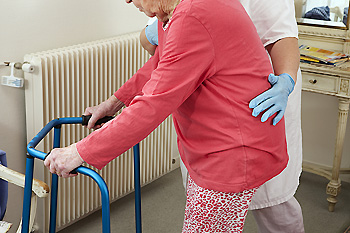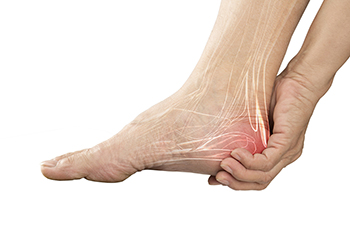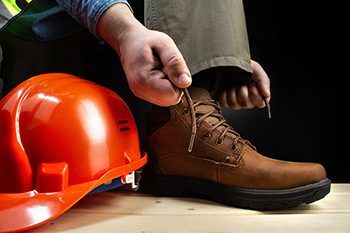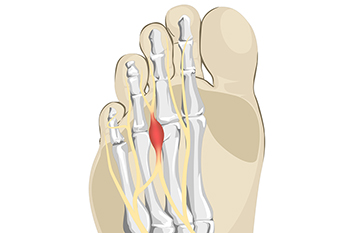Items filtered by date: February 2023
Preventing Falls in the Bedroom

As people age, they can become increasingly susceptible to suffering from some kind of fall. As a result, a senior might experience diminished foot health. Therefore, it is important to do whatever you can to prevent these falls or trips from occurring in the first place. One of the places where a senior might fall down is in their bedroom. There are several steps that can be taken to minimize falls in a senior’s bedroom. For example, many falls are due simply to a lack of light in the relevant area. So a senior might consider buying a bedside lamp to illuminate the bedroom floor. Additionally, a senior might consider ensuring that the bed is at an appropriate height. Beds that are too high might result in falls while getting out. Lastly, since some seniors are light-headed when they first wake up, a senior might consider trying to minimize falls by taking their time to rise. It is suggested that you contact a podiatrist for more information on preventing falls.
Preventing falls among the elderly is very important. If you are older and have fallen or fear that you are prone to falling, consult with Jim Maxka, DPM from South Penn Foot & Ankle Associates. Our doctor will assess your condition and provide you with quality advice and care.
Every 11 seconds, an elderly American is being treated in an emergency room for a fall related injury. Falls are the leading cause of head and hip injuries for those 65 and older. Due to decreases in strength, balance, senses, and lack of awareness, elderly persons are very susceptible to falling. Thankfully, there are a number of things older persons can do to prevent falls.
How to Prevent Falls
Some effective methods that older persons can do to prevent falls include:
- Enrolling in strength and balance exercise program to increase balance and strength
- Periodically having your sight and hearing checked
- Discuss any medications you have with a doctor to see if it increases the risk of falling
- Clearing the house of falling hazards and installing devices like grab bars and railings
- Utilizing a walker or cane
- Wearing shoes that provide good support and cushioning
- Talking to family members about falling and increasing awareness
Falling can be a traumatic and embarrassing experience for elderly persons; this can make them less willing to leave the house, and less willing to talk to someone about their fears of falling. Doing such things, however, will increase the likelihood of tripping or losing one’s balance. Knowing the causes of falling and how to prevent them is the best way to mitigate the risk of serious injury.
If you have any questions, please feel free to contact our office located in Hanover, PA . We offer the newest diagnostic and treatment technologies for all your foot care needs.
Various Reasons to Have Heel Pain

A common cause of heel pain is overuse. People who enjoy running are apt to experience heel pain at some point, and protective measures can be implemented which may help to minimize it. Conditions such as flat feet and obesity may lead to developing heel pain, in addition to having an abnormal foot structure. An injury to the Achilles tendon will generally affect the heel. This tendon is located in the calf, and it connects the heel to the calf muscles. The heel often becomes inflamed and walking can be difficult. Additionally, some people develop stress fractures in the heel, which can be very painful, and prompt medical attention is often sought. Other forms of heel pain can include osteomyelitis, which is a bone infection, and a contusion, or bruised heel bone. It is important to obtain a proper diagnosis of any type of heel pain, which consists of having an X-ray taken, or possibly undergoing an ultrasound or MRI. Treating heel pain requires the expert advice of a podiatrist, and it is strongly suggested that you contact this type of doctor who can help you with the correct treatment.
Many people suffer from bouts of heel pain. For more information, contact Jim Maxka, DPM of South Penn Foot & Ankle Associates. Our doctor can provide the care you need to keep you pain-free and on your feet.
Causes of Heel Pain
Heel pain is often associated with plantar fasciitis. The plantar fascia is a band of tissues that extends along the bottom of the foot. A rip or tear in this ligament can cause inflammation of the tissue.
Achilles tendonitis is another cause of heel pain. Inflammation of the Achilles tendon will cause pain from fractures and muscle tearing. Lack of flexibility is also another symptom.
Heel spurs are another cause of pain. When the tissues of the plantar fascia undergo a great deal of stress, it can lead to ligament separation from the heel bone, causing heel spurs.
Why Might Heel Pain Occur?
- Wearing ill-fitting shoes
- Wearing non-supportive shoes
- Weight change
- Excessive running
Treatments
Heel pain should be treated as soon as possible for immediate results. Keeping your feet in a stress-free environment will help. If you suffer from Achilles tendonitis or plantar fasciitis, applying ice will reduce the swelling. Stretching before an exercise like running will help the muscles. Using all these tips will help make heel pain a condition of the past.
If you have any questions please contact our office located in Hanover, PA . We offer the newest diagnostic and treatment technologies for all your foot and ankle needs.
Preventing Foot Problems if You Work on Your Feet

Some jobs require one to stand on their feet for prolonged time periods. This can cause tiredness and increase the risk of foot problems as it puts strain on bones, joints, tendons, muscles, and ligaments. Standing for long periods of time can reduce blood flow to the lower extremities or create an accumulation of blood in the foot or ankles, also leading to soreness. Flat feet, plantar fasciitis, and edema are all problems associated with working on your feet all day. Tips for preventing such pain include taking more seated breaks, standing on different surfaces, using anti-fatigue mats underfoot, and wearing appropriate footwear. Footwear includes shoes and socks, and both should fit well, without being too tight or loose. Shoes should support the arch well and have cushioning that absorbs shock and stress. If you work on your feet all day and have foot problems, see a podiatrist who can provide additional suggestions to help you feel more comfortable.
While working on the feet, it is important to take the proper care of them. For more information about working on your feet, contact Jim Maxka, DPM from South Penn Foot & Ankle Associates. Our doctor will treat your foot and ankle needs.
Working on Your Feet
Standing on your feet for long periods of time can cause stress and pain in your feet. Your whole body may experience change in terms of posture, back pain, bunions, callouses and or plantar warts. There are ways to avoid these conditions with proper foot care, smart choices and correct posture.
Positive Changes
Negative heeled shoe – Choosing this shoe type places the heel slightly lower than the ball of the foot. These are great for overall foot health. Find shoes that fit you correctly.
Go barefoot – Our feet were not designed to be enclosed for all hours of the day. Try to periodically expose your feet to air.
Eliminate Pain
Foot Exercises – Performing simple exercises, incorporating yoga and doing stretches are beneficial. This will allow increased blood flow to the area and muscles of the foot.
Achilles tendon – Stretching the foot out flat on the floor will relax the calf muscles and tendon. These exercises can be performed almost anywhere. Make sure you add these exercises to your daily regimen.
With a little bit of this information and knowing more about foot health, you will notice changes. Foot stretches and proper footwear will help with pain and prevent further issues.
If you have any questions please feel free to contact our office located in Hanover, PA . We offer the newest diagnostic and treatment technologies for all your foot and ankle needs.
Heel Pain Can Be Treated!
A Common Cause of Morton’s Neuroma

The foot condition that is known as Morton’s neuroma affects the nerve between the third and fourth toes. It generally happens to women who frequently wear high heels, which can compress the toes. In severe cases, the pain can be excruciating, and relief methods are often sought. The symptoms that many patients feel can be likened to having a small pebble or stone in the shoe, and the foot may tingle or feel numb. In mild cases, temporary relief may be found when wider shoes are worn with a low heel, and extra weight is shed, if applicable. Additionally, wearing soft insoles in wider shoes may help to lessen the pressure on the nerve. People who suffer from Morton’s neuroma often seek the counsel of a podiatrist, who can recommend the correct treatment, which may include surgery for the removal of the nerve.
Morton’s neuroma is a very uncomfortable condition to live with. If you think you have Morton’s neuroma, contact Jim Maxka, DPM of South Penn Foot & Ankle Associates. Our doctor will attend to all of your foot care needs and answer any of your related questions.
Morton’s Neuroma
Morton's neuroma is a painful foot condition that commonly affects the areas between the second and third or third and fourth toe, although other areas of the foot are also susceptible. Morton’s neuroma is caused by an inflamed nerve in the foot that is being squeezed and aggravated by surrounding bones.
What Increases the Chances of Having Morton’s Neuroma?
- Ill-fitting high heels or shoes that add pressure to the toe or foot
- Jogging, running or any sport that involves constant impact to the foot
- Flat feet, bunions, and any other foot deformities
Morton’s neuroma is a very treatable condition. Orthotics and shoe inserts can often be used to alleviate the pain on the forefront of the feet. In more severe cases, corticosteroids can also be prescribed. In order to figure out the best treatment for your neuroma, it’s recommended to seek the care of a podiatrist who can diagnose your condition and provide different treatment options.
If you have any questions, please feel free to contact our office located in Hanover, PA . We offer the newest diagnostic and treatment technologies for all your foot care needs.

